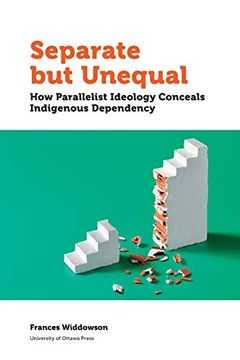Share
Separate but Unequal: How Parallelist Ideology Conceals Indigenous Dependency (Politics and Public Policy)
Frances Widdowson
(Author)
·
University of Ottawa Press
· Paperback
Separate but Unequal: How Parallelist Ideology Conceals Indigenous Dependency (Politics and Public Policy) - Widdowson, Frances
£ 20.70
£ 23.00
You save: £ 2.30
Choose the list to add your product or create one New List
✓ Product added successfully to the Wishlist.
Go to My WishlistsIt will be shipped from our warehouse between
Tuesday, July 02 and
Thursday, July 04.
You will receive it anywhere in United Kingdom between 1 and 3 business days after shipment.
Synopsis "Separate but Unequal: How Parallelist Ideology Conceals Indigenous Dependency (Politics and Public Policy)"
Separate But Unequal provides an in depth analysis of the ideology of parallelism - the prevailing view that indigenous cultures and the wider Canadian society should exist separately from one another in a "nation-to-nation" relationship. Using the Final Report of the Royal Commission on Aboriginal Peoples as an example, this book shows how the single-minded pursuit of parallelism has distorted our understanding of indigenous-non-indigenous relations. It also uses the political economy literature to provide an alternative framework for examining indigenous dependency. This new perspective - the political economy of neotribal rentierism - combines a number of insights from different theoretical positions and shows that indigenous peoples' circumstances have been inextricably linked to the development of capitalism in Canada. While indigenous peoples were integral participants in the fur trade, the transition from mercantilism to industrial capitalism led to their marginalization, in part, because of the difficulties experienced participating in a more developed economic and political system. The profit seeking character of the Canadian state, in combination with racist attitudes, meant that skilled producers were imported, and the indigenous population was neglected and warehoused in unviable areas. This historical and material analysis indicates that parallelist proposals for increasing indigenous autonomy in all spheres of public policy will not result in a more balanced relationship between indigenous and non-indigenous peoples, as they are merely restoring archaic economic, political and ideological forms that will continue to isolate the native population.
- 0% (0)
- 0% (0)
- 0% (0)
- 0% (0)
- 0% (0)
All books in our catalog are Original.
The book is written in English.
The binding of this edition is Paperback.
✓ Producto agregado correctamente al carro, Ir a Pagar.

